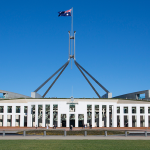
Remember when Kevin Rudd petitioned for a Royal Commission into media diversity? He ended up with a Senate inquiry into the issue. Zali Stegall’s climate change Bill? That was examined by a Parliamentary inquiry. And while the Coalition Government has announced internal investigations to address how it handles sexual assault allegations, none of these are independent inquiries – which the public, legal experts, and public are demanding. For most of us following these important news stories from the sidelines, there’s a big question underpinning it all: what are the differences between them all?
Here’s your basic guide to the difference between Royal Commissions and inquiries – senate, parliamentary, and everything else.
Royal Commission | Senate or Parliamentary Inquiry | Judicial Inquiry | Independent Body Inquiry | |
Conducted by | Panel of experts led by former judge (no serving politicians) | Currently serving MPs or Senators, no topic expertise required | Led by current or former judge (but is not a legal trial) | Relevant independent body, tasked by the Govt |
Reccs made to | Cabinet | Senate or House of Reps | Relevant Department | Relevant Department |
Govt Obligated to act? | No | Must respond within 6 months, but does not have to implement reccs | No | No |
How does a Royal Commission work?
Royal Commissions are the highest level of public inquiry, reserved for the most serious matters of public interest. It is conducted by a panel of experts (never currently-serving politicians), led by a Chair who is usually a former judge.
A Commission investigation involves heavy research, expert consultation and public submissions. It is somewhat like a trial, and the Commission has power to summon witnesses to provide evidence under oath, can seize documents, etc.
While the Government sets the scope, appoints the panel and provides the funding but they are not involved in the investigation unless as witnesses.
Once the investigation is complete, the Commission publishes a full report with recommendations to the Cabinet. The Government is not obligated to implement the recommendations.
Most recently, the long-awaited Aged Care Royal Commission report was released – with 148 recommendations for the Government to consider.
Related Posts
How does a Senate or Parliamentary Inquiry Work?
Senate and Parliamentary Inquiries are Government investigations into a specific policy area. They are conducted by a Committee of currently serving politicians. There are currently 73 Committees, conducting 134 public inquiries.
Committees require a pre-determined mix of Government, Opposition and Independent members. They don’t have to have relevant expertise, interest or background in the topic to sit on a Committee, however MPs with a conflict of interest to a specific inquiry will be replaced.
First, the Committee publishes the terms of the inquiry and calls for public submissions on the topic. Those submissions determine the direction and focus of the next stage, public hearings. This is when the Committee calls relevant witnesses and experts to provide testimony, answer questions on the topic, and provide any evidence.
After considering all testimony and submissions, the Committee compiles a final report with recommendations for the relevant Chamber – House of Representatives for Parliamentary Committees; the Senate for Senate Committees. The Government has six months to respond to the report, and it doesn’t have to accept the recommendations.
How about other independent inquiries?
There are a few other avenues for investigations into matters of public interest. Independent inquiries can be conducted by a current or former judge (judicial inquiry) or an existing body like the Australian Human Rights Commission or NSW Independent Commission Against Corruption (ICAC).
They’ll be asked by the Government to conduct an investigation into a specific area, report on their findings and make recommendations for change. The scope and powers of these bodies are set by the Government, with the final reports and recommendations generally released publicly. Recent examples are:
- Inquiry into former judge Dyson Heydon and workplace harassment in the High Court
- Victorian Government’s inquiry into the COVID-19 Hotel Quarantine program
- National Inquiry into Sexual Harassment in Australian Workplaces
- ICAC’s ongoing investigations into corruption within the NSW Government










